A middleman handed out nearly 10 million euros in commissions on the direct orders of Airbus in order to facilitate the sale of the manufacturer's aircraft in Egypt, according to secret documents obtained by Mediapart and German publication Der Spiegel, which have been analysed in conjunction with partners in the European Investigative Collaborations (EIC). These documents are now being examined by prosecutors in France and detectives in London as part of a wide-ranging investigation into alleged corruption by the European aircraft manufacturer.
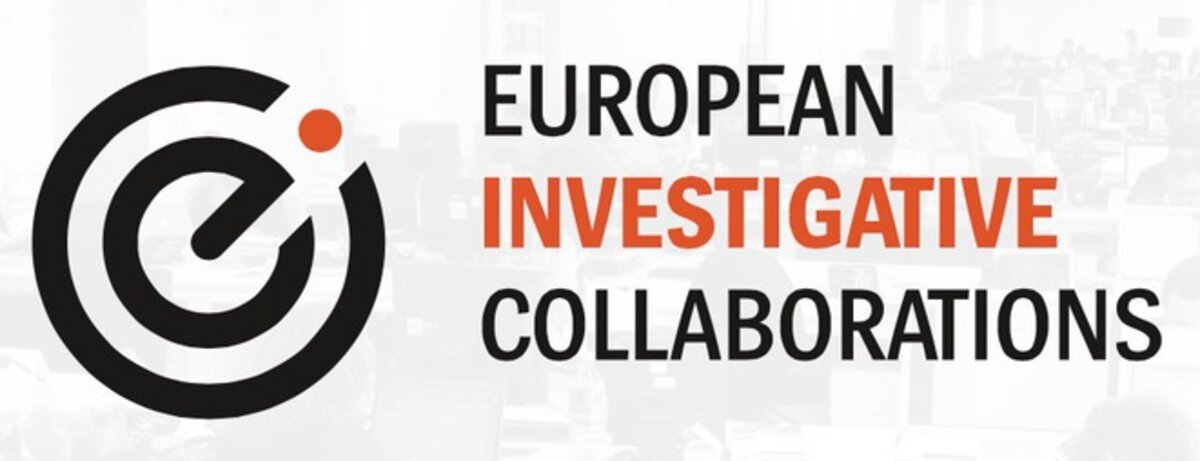
Enlargement : Illustration 1

The documents concern one of the contracts that helped boost Airbus's fortunes in the early 2000s. In April 2003 the European group sold seven long-haul A330 aircraft to EgyptAir, one of its most loyal customers in the Middle East, valued 900 million euros at list price. The deal was a blow to Airbus's American rival Boeing who had been seeking to establish a foothold in Egypt.
Today that deal is being probed by France's financial fraud prosecution unit the Parquet National Financier (PNF) and Britain's Serious Fraud Office (SFO) who are in charge of a wide-ranging investigation into alleged corruption by Airbus. For nearly three years investigators have been looking to prove that the aircraft manufacturer used intermediaries to pay bribes to help the sale of civilian airliners (see Mediapart's story here).
The PNF has refused to make any comment on the issue. But the documents unearthed by Mediapart and Der Spiegel are explosive. For the first time they show that an intermediary from the United Arab Emirates, Abbas al-Yousef, handed out nearly 10 million euros on the direct orders of Airbus under the cover of a “lobbying” contract aimed at helping clinch the sale of aircraft to EgyptAir. Instructions on the redistribution of the sums and who was to receive the money came from the Strategy and Marketing Organisation International Operations (SMO-IO) department, the Airbus “secret service” which managed and paid intermediaries.
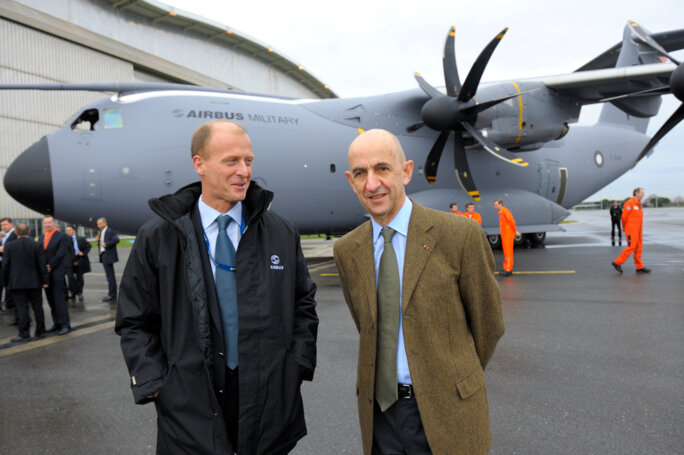
Enlargement : Illustration 2

The case poses a challenge to Airbus's defence. Officially the aircraft manufacturer paid its intermediaries exclusively to benefit from their influence in countries which are discreetly described as “difficult”. If, by chance, these “commercial agents” paid bribes then the group officially knew nothing about it and was not responsible.
Airbus came up with this “Chinese wall” system in 2002 during the sale of Eurofighter jets to Austria, under the management of Thomas Enders (read Mediapart's story here). The result was that despite the paying of 100 million euros in commissions to dozens of offshore companies, German prosecutors in charge of the investigation into the sale were not able to prove corruption. The European aerospace giant has been finally sentenced with a mere fine of 81 million euros for “negligence”.
The documents uncovered by Mediapart start to break down that “Chinese wall”. And they are deeply embarrassing for the flagship European aeronautics company which at the time was co-led by Frenchman Louis Gallois and the current president Thomas Enders. What did they know of the hidden commissions on the EgyptAir deal? When questioned by the EIC the two men, and Airbus itself, refused to make any comment on the grounds that a probe is in progress.
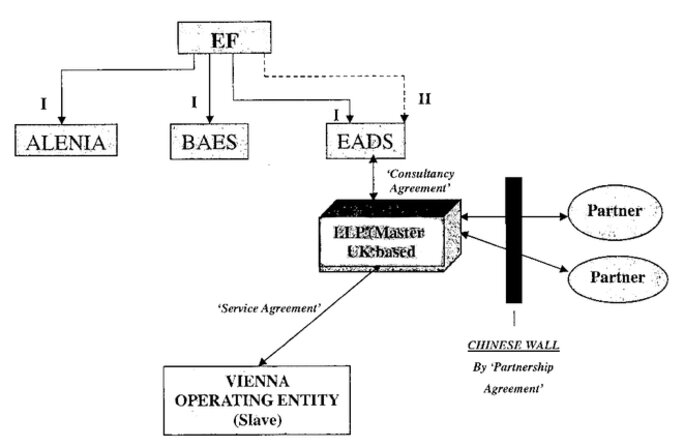
Enlargement : Illustration 3

In 2015 Thomas Enders took on the mantle of “Mr Clean” by dismantling the SMO-IO and then approving the policy of Airbus “self-reporting” concerns about its behaviour to the authorities. It was this that led to the Franco-British criminal investigation and then a second one which started in the United States at the end of 2017. This probe could potentially have devastating consequences for the group with a fine of more than a billion euros and even the possibility of being excluded from bidding for future American public contracts if it is found guilty.
However, Thomas Enders – nicknamed 'Major Tom' – has himself been weakened by the corruption affairs and in particular by the heavy-handed way in which internal investigations have been carried out (see Mediapart stories in French here and here). In the end he was obliged to retire, having first pushed out the group's leading figures. He will be replaced on April 10th by Frenchman Guillaume Faury.
The man at the origin of Airbus's fresh woes is Abbas al-Yousef, aged 64, nicknamed “Joe”. A former fighter pilot and colonel in the United Arab Emirates air force, who lives in Dubai, he once told a businessman that he earned his first millions as a “consultant for the West” when he was just 22. In the 1990s he became very wealthy by becoming the main intermediary in the Gulf for leading French defence companies such as Dassault, Thales and Nexter. Until 2001 corruption was legal and was even tax deductible.
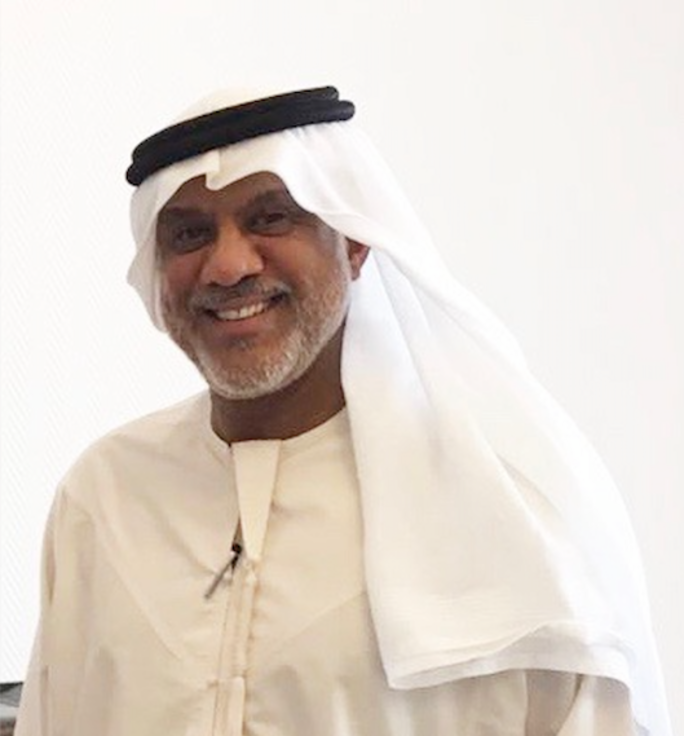
As Mediapart has revealed, in 1993 Abbas al-Yousef helped with Nexter's sale of Leclerc tanks to the Emirates, tanks which are today being used in the Yemen war. The middleman received 195 million dollars to carry out “acts of corruption” among “officials from the United Arab Emirates” to win this 3.2 billion dollar deal, as Nexter admitted in writing.
Abbas al-Yousef has also used his know-how and contacts to help Airbus. According to several sources he was in direct contact with Jean-Paul Gut, who was then the all-powerful commercial director of the group, and who quit Airbus in 2007 with a total package worth 86 million euros. It was Gut who set up and ran the EADS International department which became SMO-IO when EADS became Airbus, and which managed the system of intermediaries now at the centre of the criminal investigations.
“Abbas al-Yousef was involved in the majority of the major deals between EADS/Airbus and the Emirates and he contributed to Jean-Paul Gut's success inside the group,” says someone who knows the middleman well. The two men complemented each other; Gut was close to the Royal Family in Qatar while Abbas al-Yousef is very close to those in power in the Emirates – he was an air force instructor to one of sheikh Zayed bin Sultan Al Nahyan's sons.
But in recent years the middeman's own business deals have been less successful. In particular Abbas al-Yousef sank a lot of money into an abortive oil project in the Congo. He also handed over at least 48 million dollars to a fraudster from Togo who had promised to pay him a part of the fortune of the late ruler of the Ivory Coast, Robert Guéï.
In the end the calamitous management of his group began to worry Abbas al-Yousef's children. They brought in consultants to audit the companies run by their father, with whom they are now in open conflict. On top of the losses and debts run up by their father's group they discovered its relations with Airbus.
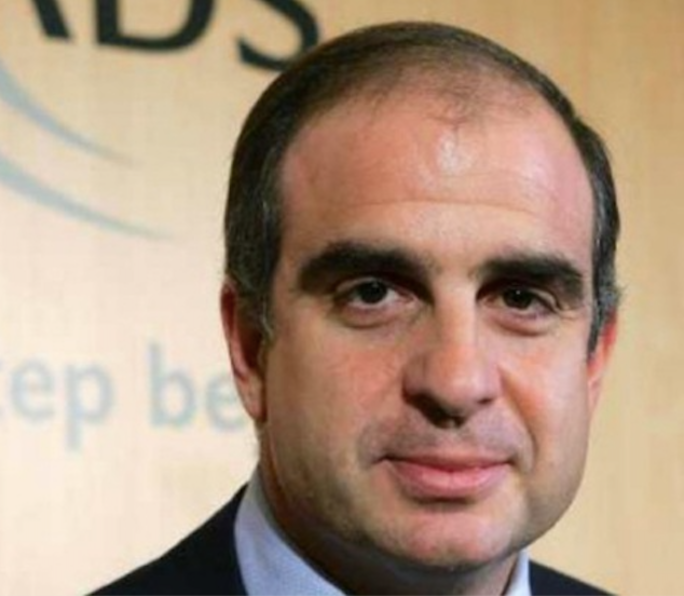
Enlargement : Illustration 5

It is therefore as a result of this family conflict that the aircraft manufacturer is today in difficulty. To protect himself from potential suspicions Abbas al-Yousef's son and his financial advisor preferred to give evidence on their own initiative to investigators from France's PNF and police officers from the Office Central de Lutte Contre la Corruption et les Infractions Financières et Fiscales (OCLCIFF), the French police's anti-corruption unit.
It was on April 1st 2003 that Airbus sold seven A330s to EgyptAir. In July that year the European group signed a contract for “services and lobbying” with the Lebanese company Samit International in relation to this Egyptian deal. But why use an intermediary three months after the sale was concluded? Officially it is because the contract signed with Samit was simply to formalise an “orally entered” agreement made in Paris back in May 2002.
Samit International belongs officially to a man called Saif al-Mazrouei, an old friend of Abbas al-Yousef. The documents unearthed by Mediapart show that he was in reality a frontman and that Samit's operations were in fact run by Abbas al-Yousef and the Swiss man who manages his offshore companies, Alexander Breuer.
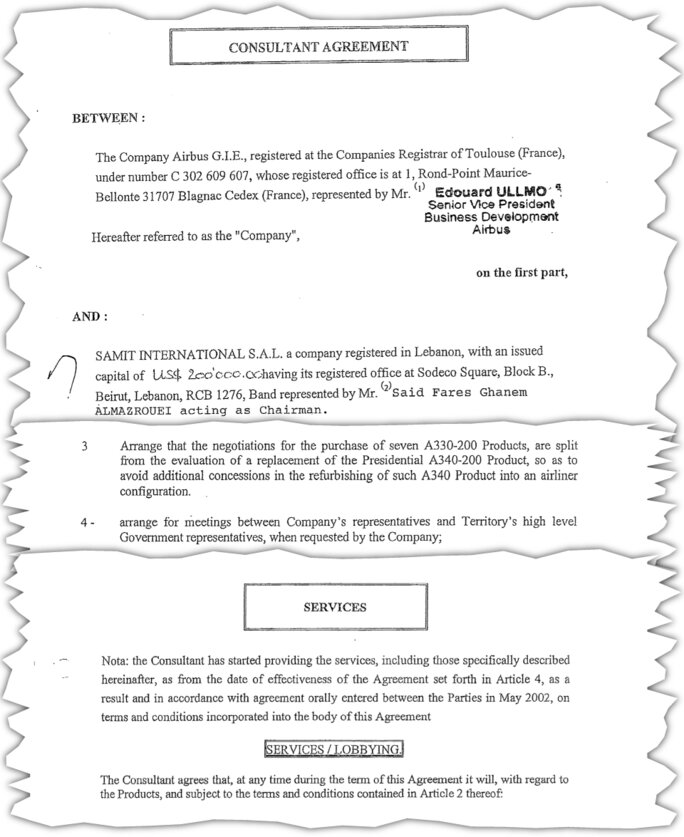
Enlargement : Illustration 6

The July 2003 contract was signed by al-Mazrouei and Airbus's commercial director Edouard Ullmo, Jean-Paul Gut's right-hand man inside the SMO-IO department. In the deal Samit agreed to organise meetings with “high level government representatives” of Egypt in order to facilitate the sale of seven A330 aircraft and A320 narrow-body aircraft, with a commission of 1.5%.
Offshore commissions to create a 'favourable political environment'
Airbus and Sanit signed a new contract in February 2006. This time it involved selling six A320 aircraft to EgyptAir's subsidiary Air Cairo. Samit's role was to create a “political environment favourable to” Airbus in order to fight “against a pressure from competitor's governmental authorities”, in other words the United States, which had just helped Boeing to conclude a sale of commercial aircrafts in Egypt.
Once again the contract was retroactive as the purchase of six Airbus by Air Cairo had been announced nine months before. And once again it was justified on the grounds that it formalised an “orally entered” agreement that was apparently made in May 2005.
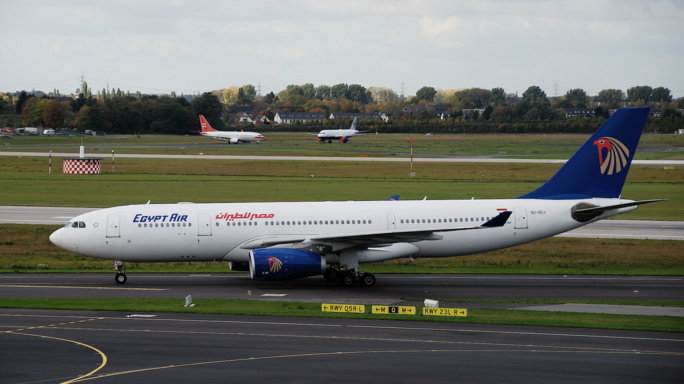
Enlargement : Illustration 7

The question arises as to why these written agreements had not been signed immediately after the verbal accords. Was it because in reality the deals were aimed at recompensing third parties once the sales had been agreed?
That is, at any rate, what the documents uncovered by Mediapart suggest. Between 2004 and 2006 Samit received a total of 10.4 million euros from Airbus over the two Egyptian deals. But the Lebanese company immediately paid 9.5 million euros to six different companies, including Prime Financial Holdings, Aero Consulting & Marketing and Inter Technologies.
A confidential chart drawn up by Alexander Breuer, al-Yousef's Swiss manager, indicates that these transfers of money were “payments made for AB” in other words Airbus. This document (see below) states that the instructions were given by “JCC”, or Jean-Claude Cadudal, the man in charge of payments and offshore schemes inside the SMO-IO department.

Enlargement : Illustration 8

Samit paid 670,000 euros to a company called Sion LLC after a “meeting” between “BRE” (Alexander Breuer) and Cadudal on May 3rd 2005. Another firm, Elpeko Limited, was paid 5 million euros following a “meeting JCC and telco on 8.11.2006” while a firm called Malana Holding received 3 million euros “according to instruction” of Jean-Claude Cadudal. He did not respond to a request for comment from Mediapart.
After the money was paid out Samit was left with just 526,038 euros at the end of 2006. One telling detail on the chart is that this remaining money was designated as “available for AB”, and later it would be accounted for in the Abbas al-Yousef group's financial statements as a debt owed to Airbus. In summary, it seems that Samit was not a consultancy firm run by an agent, but a structure entirely controlled by the aircraft manufacturer to carry out its secret payments.
It is now down to the legal authorities to find out who the beneficiaries were of the money paid to the six companies. But one of them, Malana Holding, registered in Lebanon, appears in another operation linked to Abbas al-Yousef, about which Airbus has launched an internal investigation after initial revelations in The Guardian newspaper.
The affair involves a firm called Avinco which sells secondhand aircraft and helicopters. The group was 100% owned by Abbas al-Yousef. But in reality it was secretly owned by Airbus, through secret agreements signed with Yellow Sun Holding, a letterbox company registered in Curaçao in the Caribbean and 100% held by Airbus via a firm of Swiss lawyers who also serve as a front.
Another company, Eolia, registered in Malta and which retrofits passenger jets to carry cargo, was also secretly financed by Airbus. According to a former executive, Eolia was going to convert old Boeing 747s into cargo planes in order to open the market up to the Airbus A380. It is claimed that Airbus hid in the background so it did not attract the attention of its US rival.
But in 2006 Eolia used Airbus money to buy a 26% stake in Avinco from Abbas al-Yousef for 19.4 million euros, a generous price given the group's value. “I think this purchase of shares was simply a means to pay Abbas al-Yousef, it was part of the systems put in place to pay the agents discreetly,” says someone who used to work in the SMO at Airbus.
During a meeting on December 11th 2006 with his Swiss manager, the middleman from the UAE said that the money would be used for “investments in the Middle east, in particular in connection with regard to Aircraft conversions (mainly AB)”. After “discussions with Airbus” Abbas al-Yousef opted for Oman or Qatar.
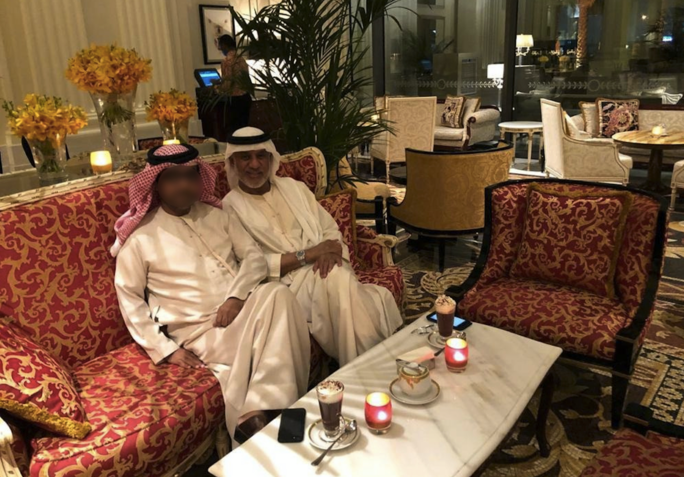
Enlargement : Illustration 9

However, it appears that the money was never used for aeronautical purposes. On January 4th 2007 al-Yousef received the 19.4 million euros from Airbus. On January 12th he transferred 16 million euros to one of his companies in Panama. That company then immediately transferred the money to Malana Holding, the Lebanese company which had already received three million euros from Samit a month earlier.
Malana belongs to a French banker who had lived in Switzerland for many years and who was convicted of money laundering at the start of the 2000s in one of the cases linked to the vast Elf fraud scandal. He is now resident in Lebanon.
Contacted by Mediapart this French banker explained that he had lent money to Abbas al-Yousef and that the 16 million euros related to the repayment of this debt. He said that Malana is a holding company that simply manages his family's fortune and that this money was never paid to a third party. He added that he had no link with either Airbus or its commercial companies, and says that at the time he was unaware that Abbas al-Yousef was one of Airbus's agents.
In 2007 Marwan Lahoud succeeded Jean-Paul Gut as number two at Airbus in charge of commerce and strategy and he reshuffled the management team at the SMO-IO. The person in charge of the financial schemes and the payment of intermediaries, Jean-Claude Cadudal, was replaced by Olivier Brun, who is today under investigation in several corruption affairs targeting Airbus.
On October 21st 2014 a secret meeting about Avinco took place between Brun and Alexander Breuer at Airbus's headquarters in Paris. According to a written account, Brun talked about how “Airbus may require some services of Abbas Yousef in connection with Kuwait” and the possibility that the middleman could once again become “active” in “difficult countries” in the Middle East – those nations where, in Airbus jargon, it is necessary to influence the decision makers. The documents notes that al-Yousef “was in contact” on this issue with “Jean-Pierre” - a reference to Jean-Pierre Talamoni, the director of the SMO-IO at the time.
Two internal sources have insisted to Mediapart that in the end Airbus never called on Abbas al-Yousef's services again. Olivier Brun says that that “the Airbus group and SMO never had a direct or indirect contractual relationship with Mr al-Yousef” after his arrival in post. Another former SMO employee says that al-Yousef was not employed any more after he refused to submit himself to the new compliance test that was imposed on intermediaries in 2007.

Enlargement : Illustration 10
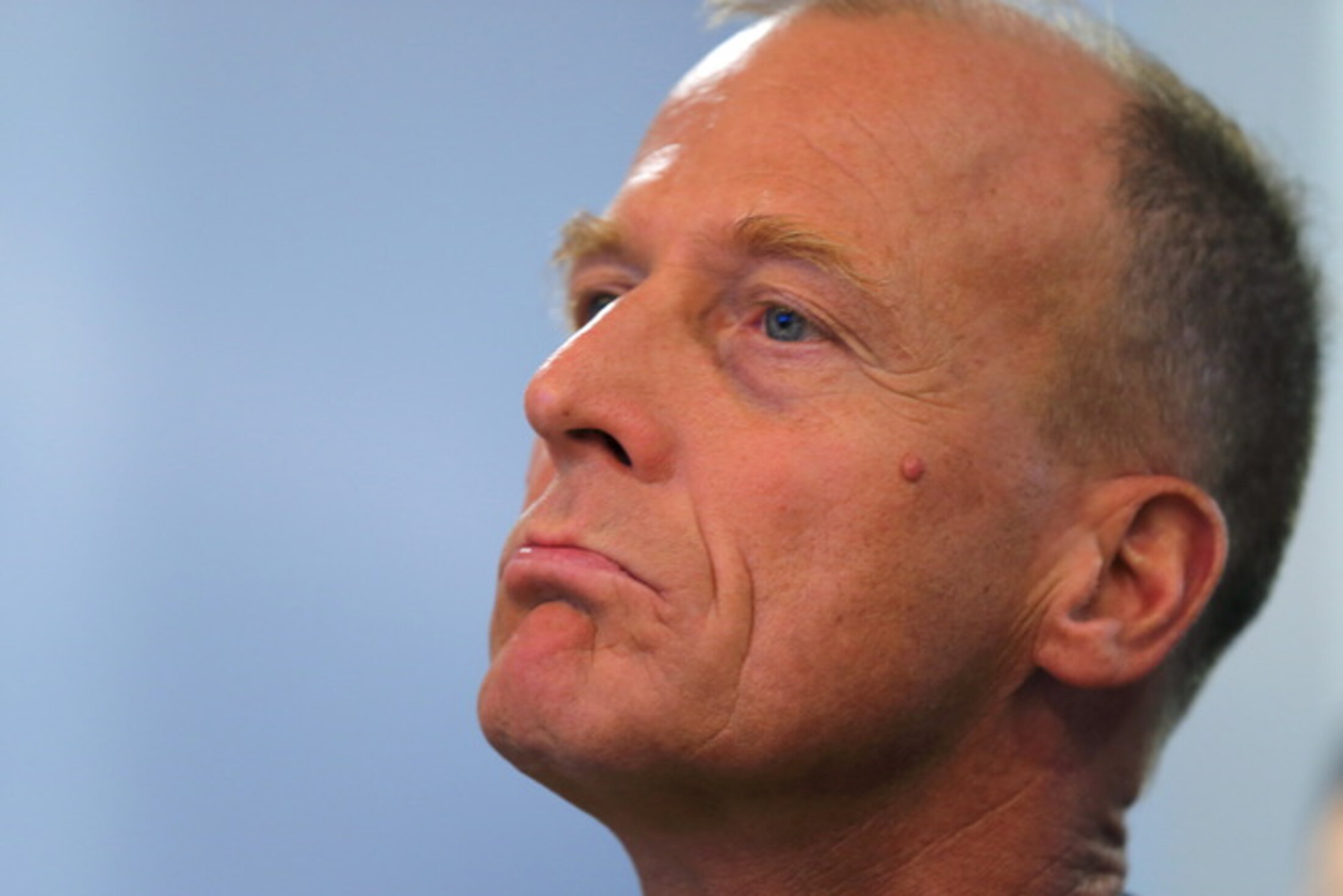
Contacted by the EIC, Abbas al-Yousef did not respond. Mediapart did speak to one of his lawyers at the end of 2017, who said: “When I called Mr al-Yousef to tell him about your questions he told me 'Whatever you do, don't give him my phone number!' [Abbas al-Yousef] doesn't deny there's an issue but he told me that you should address all questions on this affair to Airbus.”
The senior Airbus executives who were in post at the time of these events are also not making any comment. Those in charge of the SMO-IO department until 2007, Jean Paul Gut, Edouard Ullmo and Jean-Claude Cadudal, either did not respond or refused to comment. It was the same with the co-CEOs of the time, Louis Gallois and Thomas Enders.
In September 2014 Enders, who became the sole boss of the group, cut all payments to “commercial agents”. But he did not succeed in leaving his successor a company free of all corruption affairs. Before he left Thomas Enders was hoping to reach a deal with the French and British legal authorities that would have resulted in no criminal sanctions for the group. But the investigation is so large in scale that it is taking more time than expected. According to internal sources at Airbus it will not be completed before the end of 2019 at the earliest.
-----------------------------------------------------
If you have information of public interest you would like to pass on to Mediapart for investigation you can contact us at this email address: enquete@mediapart.fr. If you wish to send us documents for our scrutiny via our highly secure platform please go to https://www.frenchleaks.fr/ which is presented in both English and French.
----------------------------------------------------
- The French version of this article can be found here.
English version by Michael Streeter


